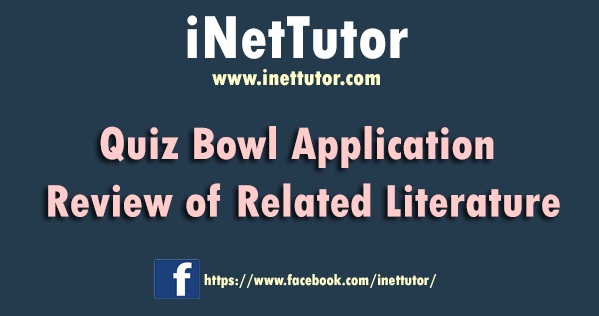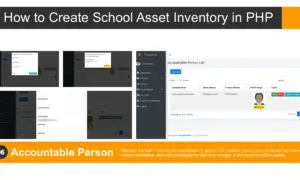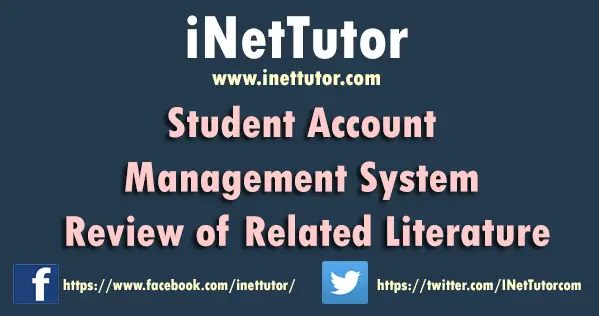Quiz Bowl Application Review of Related Literature
The following studies and systems will be used as a guide for the development of quiz game application. The quiz bowl application is a LAN-based project using tools like: Visual Basic and MS Access.
REVIEW OF RELATED LITERATURE
According to Metzger-Linville, (2007) Quiz bowl is an enjoyable, educational technique that uses a game format derived from the TV show College Bowl. In most cases, the quiz-bowl questions are based entirely on one subject, typically the subject covered in the previous lecture. But the instructor can make it interesting by including non-curricula questions. It keeps the students engaged and encourages them to actively participate in class. The amount of knowledge that students can absorb can be significant. Students learn from each other; the role of the instructor becomes that of a facilitator. Most of the participants in quiz bowl contests enjoy the experience, especially when the instructor helps them relax, laugh at their own mistakes, and get caught up in the contagious spirit of the game. Using this technique, the individual and team efforts are recognized, providing an opportunity for students and groups to demonstrate their knowledge.

While strong leadership and coaching contribute to individual or team success, individuals involved inevitably pursue their own independent learning through research for answers. Members can also learn by helping to develop questions for the quiz bowl. (https://www.naqt.com/cc/cc-quiz-bowl.html)
NAQT says Success in quiz bowl requires a team to be familiar with noted events, discoveries, and people from all fields of human endeavor; this is a difficult task and one that may require additional resources than the textbooks of a standard curriculum. NAQT recommends the following books and periodicals for players who want to take their knowledge base–and playing ability–to the next level since they contain facts, theories, and anecdotes that are likely to appear in questions. These would also serve as valuable reference material for question-writing for teams that write practice questions for themselves. Keep in mind that NAQT questions are drawn from a wide variety of sources that may or may not include the works listed here. These works are recommended by NAQT’s members (all past players), but there is no guarantee that even a single question will be written out of them in the future; memorizing these works (even if that were possible) will not guarantee a national championship!(https://www.naqt.com/References/)
According to Paul Lujan and Seth Teitler(October 23, 2003)A question should consist of a large number of clues. These clues should progress in a pyramidal fashion; that is the hardest clues should be at the beginning of a question and progress to the easiest clues at the end. Clues should be uniquely identifying; if, after part of a question, the clues allow for multiple possible answers, then the question is a bad one. Clues should also be substantial; that is, they should have genuine importance to the subject. (http://www.ocf.berkeley.edu/~quizbowl/qb-writing.html)
According to Jeffrey Hill the Quiz Bowl Resource Database collects information about the various aspects of Quiz Bowl and how they are all related.
The database uses HS Quiz bowl forum credentials to identify users. If you are logged into the forums, you are logged into the Quiz Bowl Resource Database and can post information without any additional registration!
The initial version of the database combines the tournament listing functionality of the old HS quiz bowl tournament database with the SQBS hosting capabilities originally offered at scobo.net. You can find tournaments to attend, list a tournament you are hosting, view or post stats for past tournaments, and learn more about question sets and effortlessly discover which tournaments are using them.(http://www.hsquizbowl.org/db/)
Perhaps the most commonly used quiz bowl reference is Benét’s Reader’s Encyclopedia. This work has mostly short articles and is intended to be a general source for understanding allusions and a work’s historical and intellectual context. The contents go well beyond literature “proper,” to include artists, movements, mythology, historical events, and philosophy. Benét’s frequent use as a source for questions has led to many of its anecdotes becoming overused and significantly less difficult than one might expect. While a superb source to prepare from, inexperienced writers should exercise caution in incorporating its interesting facts into their questions.(https://www.naqt.com/References/)
Since 1994, Academic Competition Enterprises (ACE) has been hosting camps for academic competitors from across the country. Over the years, we have worked with thousands of students, including many champions of a multitude of academic competitions, such as Scholars’ Bowl, History Bowl, Quiz bowl, and the game show Jeopardy!(http://aceqb.com/about/what-is-ace-quizbowl-camp/)
According to National Academic Tournaments, LLC (2014) like nearly all activities in which score is kept, quiz bowl is fun to play on a casual, social level without investing significant time in improving one’s ability. Nonetheless, it is a competitive endeavor, and no national championship has ever been won by a team, however intelligent and educated, that had just sat down to play for the very first time. Winning consistently at the highest level has only been brought about by diligent, directed preparations.(https://www.naqt.com/HowTo/improve-as-a-player.html)
According to BALTIMORE, MD, (2009) Educators at the virtual school Connections Academy are offering families a fun, free, online game to help kids get into the academic swing of the new school year. Students of all ages – and their parents – can play the Connections Academy Quiz Bowl Trivia Challenge, Back-to-School Edition, and then challenge their friends. The special Back-to-School Edition is available to the public and is inspired by Connections Academy’s year-long Quiz Bowl Challenge – a popular activity designed to educate and recognize Connections Academy students during the school year and one of the many clubs and activities students at the virtual school enjoy. “Educational activities that also entertain are a great way to help foster a love of learning in children,” said Dr. Patricia Hoge, Vice President of Curriculum and Instruction for Connections Academy. “An activity like the Connections Academy Quiz Bowl Challenge provides an opportunity for parents to spend quality time with their child while promoting learning in the home. And a quiz game does a lot more than just test knowledge – it builds essential skills such as reasoning and problem solving. When played as a group it contributes to social abilities such as taking turns and waiting, as well as verbal communication when discussing an answer.(http://www.connectionsacademy.com/news/back-to-school-trivia.aspx)
Credits to the authors and developers of the study.
You may visit our Facebook page for more information, inquiries, and comments. Please subscribe also to our YouTube Channel to receive free capstone projects resources and computer programming tutorials.
Hire our team to do the project.


